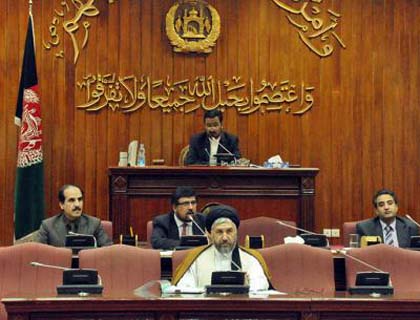KABUL - Afghanistan has identified respect for its sovereignty one of the key conditions presented to the US as part of a proposed strategic cooperation agreement, a presidential advisor said on Wednesday.
"Afghanistan wants to be independent in all its affairs and the US will have to address the security problem by providing training and equipment to Afghan forces," National Security Advisor Rangin Dadfar Spanta told lawmakers.
Spanta was summoned by the Wolesi Jirga, lower house, along with Foreign Minister Zalmay Rassoul to brief legislators on the draft strategic agreement, which President Hamid Karzai says has be decided by Afghans.
Karzai has said restoration of peace and security in Afghanistan was a major condition of his government. He has also called for taking into consideration the concerns of Afghanistan's neighbors.
Spanta said the draft agreement, under review over the past one month, would be handed to the US soon. The former foreign minister listed the country's development, use of 80 percent of foreign aid by the government and regional cooperation as some of the conditions the government had set.
He also stressed the need for US assistance to Afghanistan and increased contacts between parliaments of the two countries. He underlined Afghanistan's complete independence in political, prison, Defense, economic and other affairs.
The arrest of suspected militants and house searches should be Afghan-led, Spanta said, adding the US had pledged $11 million in assistance for the current year and $13.13 million over the next two years for capacity-building of Afghan forces.
Spanta said Afghanistan wanted to have relations with strong allies who could help it get rid of terrorism, enforce the supremacy of law and develop the country economically. "Weak politics cannot help us achieve these targets."
On US permanent military bases, the presidential advisor said they had not been provided any request in writing, but the issue had been informally and occasionally discussed.
He said the government had observations about the proposal, which should be approved by Parliament. He said China, India, Pakistan and Russia had expressed their concerns over the establishment of such bases.
In order to address the concerns of neighboring countries, Spanta said, Afghanistan planned to arrange a conference.
For his part, Zalmay Rassoul said the strategic cooperation agreement should be aimed at bringing peace and stability to the country, instead of further aggravating the security situation.
He said Afghanistan wanted to take economic advantages of the agreement. "We are trying to take into confidence our neighbors," the foreign minister continued.
Earlier, some lawmakers said the Jirga to be convened to decide on the strategic agreement should be in line with the Afghan constitution.
But Spanta explained Karzai had not indicated convening a Loya Jirga, as enshrined in the constitution. He said the assembly would be called to give suggestions to the president on the agreement.
A lawmaker from Kapisa province, Mohammad Iqbal Sapi, asked what would happen if neighboring counties did not agree to US bases in Afghanistan.
Another MP from Baghlan, Obaidullah, asked what guarantee the Afghan government had that strategic relations would not remain confined to paperwork.
A representative from western Herat province, Mohammad Rafiq Shaheer, said they should not care about neighboring countries in concluding the agreement. "We have been compelled by our neighbors to have such relations with the US."
Spanta informed the house that an international conference on Afghanistan was scheduled to take place in Germany on December 4. He said the conference agenda was being prepared by the Afghan government. (Pajhwok)

